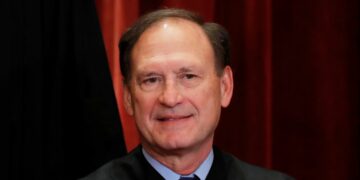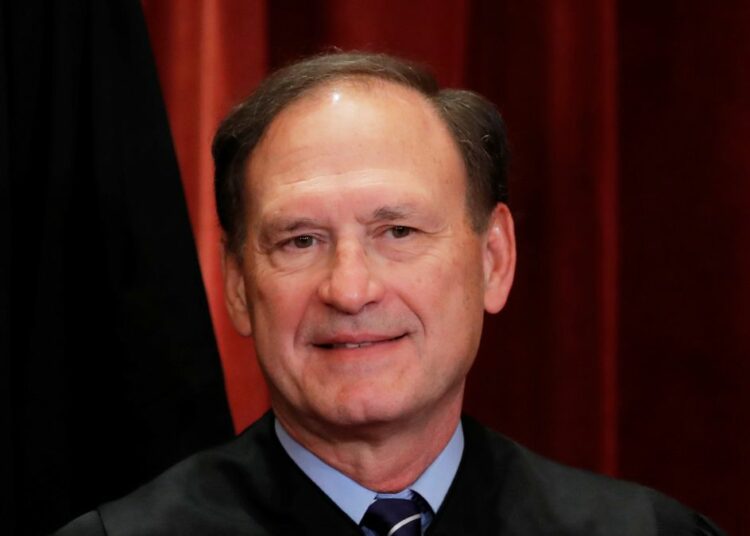To appreciate what Justice Samuel Alito did in his draft opinion in Dobbs, you have to go back to February 1, 2006, in the East Room of the White House, to his ceremonial swearing in (he had officially been sworn in the day before upon being confirmed by the Senate). Having long served on the Third Circuit Court of Appeals, Judge Alito now became a Justice of the United States Supreme Court in a ceremony introduced by President George W. Bush.
Judge Alito becomes Justice Alito. As he becomes Justice Alito, our Nation completes a process that was ordained by our Founders in Philadelphia more than 200 years ago. Under the Constitution, the President nominates and, by and with the consent—advice and consent of the Senate, appoints the Justices of the Supreme Court. This process has been carried out many times since the beginning of our democracy. And each new appointment represents a renewal of the promise of our country and our constitutional order.
Our Founders thought carefully about the role they wanted judges to play in the American Republic. They decided on a court system that would be independent from political or public pressure, with judges who serve for life. America expects members of our judiciary to be prudent in exercising judicial power and firm in defending judicial independence. So every member of the Supreme Court takes an oath to uphold the Constitution and administer justice faithfully and impartially. This is a solemn responsibility.
President Bush then focused on the Justice himself.
And the man we honor today has demonstrated his devotion to our courts and law through years of service to our country. Sam Alito has distinguished himself as a member of our military, a Federal prosecutor, Assistant to the Solicitor General, U.S. Attorney in New Jersey, and for the last 15 years, a highly respected judge on the Third Circuit Court of Appeals. Sam Alito is known for his steady demeanor, careful judgment, and complete integrity.
Integrity—defined as “uncompromising adherence to moral principles; utter sincerity, honesty, and candor”—is rare among mortals, said Shakespeare: “To be honest as this world goes is to be one man picked out of ten thousand” (Hamlet 2.2.175-176). But the Founders knew that integrity is indispensable for judges to preserve the liberty protected by the Constitution. “There can be but few men in the society,” wrote Alexander Hamilton in Federalist #78, “who will have sufficient skill in the laws to qualify them for the stations of judges. And making the proper deductions for the ordinary depravity of human nature, the number must be still smaller of those who unite the requisite integrity with the requisite knowledge.”
As the ceremony proceeded and Chief Justice Roberts administered the oath, Justice Alito declared,
I, Samuel A. Alito, Jr., do solemnly swear that I will support and defend the Constitution of the United States against all enemies, foreign and domestic; that I will bear true faith and allegiance to the same; that I take this obligation freely, without any mental reservation or purpose of evasion; and that I will well and faithfully discharge the duties of the office on which I am about to enter. So help me God.
In the comments he then made, perhaps the most significant was what he said in closing.
The many letters that I have received over the past three months have reminded me how much the people of the United States revere our Constitution and our form of government, and how much they look to the Supreme Court of the United States to protect our form of government and our freedoms. That is an awesome responsibility, and, in light of that, I think only very simple and very sincere words are appropriate in closing. And so, I simply pledge that I will do everything in my power to live up to the trust that has been placed in me.
Several months ago in a commentary on Dobbs and its potential for overturning Roe and Casey (which affirmed Roe’s essential holding), two eminent legal scholars, Robert P. George and Matthew J. Franck, reminded the Justices of the oath each had taken.
Come what may, the solemnity of an oath has its own demands on the conscience, and the justices who know that Roe and Casey are abominations have the choice—indeed the obligation—to hand down a principled ruling in Dobbs. They can thus honor the Constitution to which they swore an oath of fidelity. There is never a good reason not to do the right thing. There will never be a better time than the present to do it. We are confident that six justices know that the right thing to do is to consign Roe and Casey to the ash heap of Supreme Court precedents that were later overturned precisely because they dishonored the Constitution in whose name they were handed down.
In his draft opinion, Justice Alito makes good on his oath to support and defend the Constitution, mincing no words in his lucid analysis.
We hold that Roe and Casey must be overruled. The Constitution makes no reference to abortion, and no such right is implicitly protected by any constitutional provision…. Roe was egregiously wrong from the start. Its reasoning was exceptionally weak, and the decision has had damaging consequences…. It is time to heed the Constitution and return the issue of abortion to the people’s elected representatives.
These words about the Constitution are an invitation to remember the miracle that it is—both Madison and Washington used that very word to describe it and the convention that produced it, while British Prime Minister William Gladstone called it “the most wonderful work ever struck off at a given time by the brain and purpose of man.” According to Professor Matthew Spalding, “The creation of the United States Constitution… was one of the greatest events in the history of human liberty. The result of the convention’s work has been the most enduring, successful, enviable, and imitated constitution man has ever known.”
All Americans, including those whose objections to the Dobbs holding are protected by the Constitution, owe an immense debt of gratitude to Justice Alito, and his as-yet-unnamed colleagues joining him in the decision, for honoring their oath to “support and defend the Constitution of the United States against all enemies, foreign and domestic.” His words in the draft opinion should resound throughout the nation, calling us to preserve our precious legacy of freedom: “It is time to heed the Constitution.”




















Discussion about this post